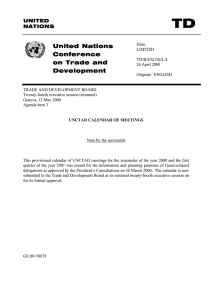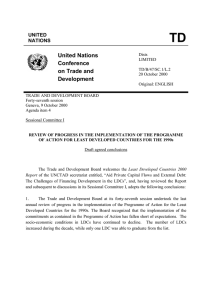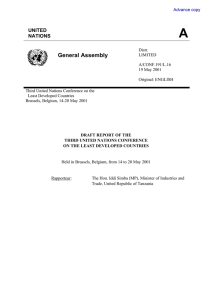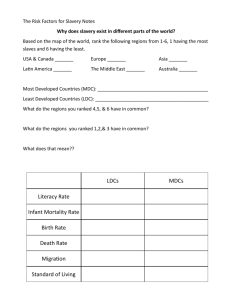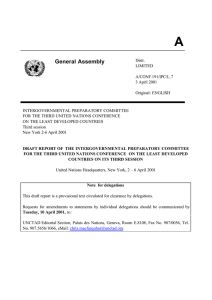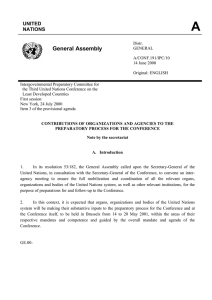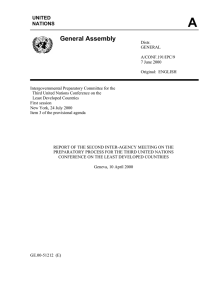A UNITED NATIONS General Assembly Third United Nations Conference on the
advertisement
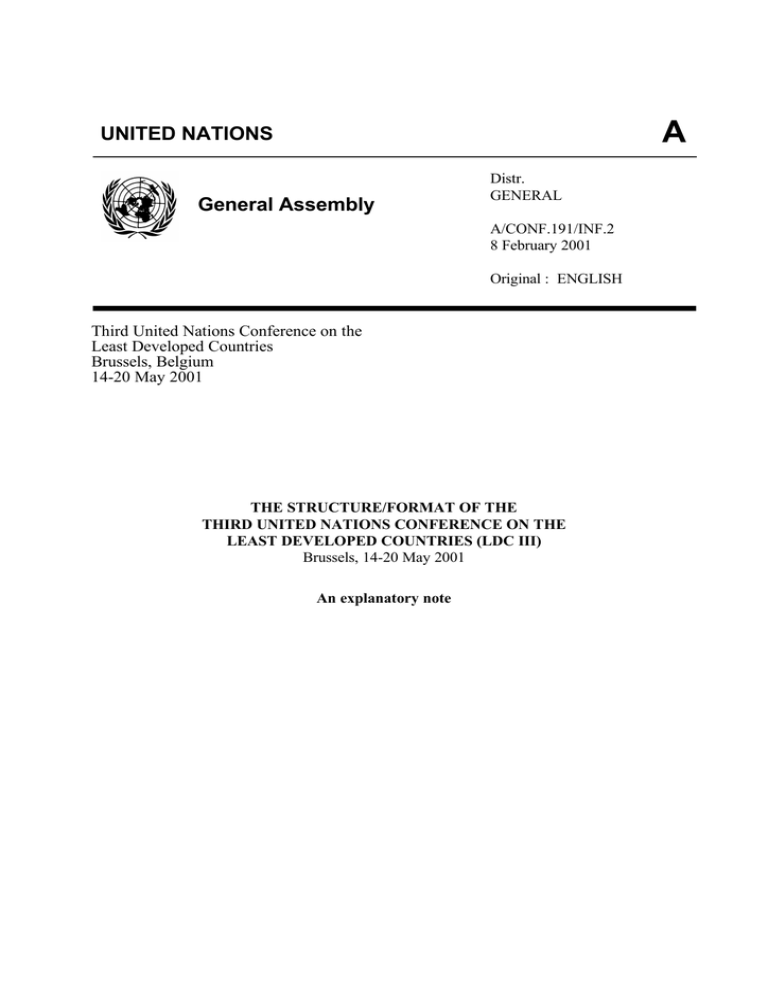
A UNITED NATIONS General Assembly Distr. GENERAL A/CONF.191/INF.2 8 February 2001 Original : ENGLISH Third United Nations Conference on the Least Developed Countries Brussels, Belgium 14-20 May 2001 THE STRUCTURE/FORMAT OF THE THIRD UNITED NATIONS CONFERENCE ON THE LEAST DEVELOPED COUNTRIES (LDC III) Brussels, 14-20 May 2001 An explanatory note A/CONF.191/INF.2 Page 2 A. Background 1. This explanatory note is intended to contribute to preparations for LDC III by providing participants with detailed information on the expected structure and format of the Conference. It should be read in conjunction with the attached updated diagramme. 2. It should be recalled that the structure/format as currently proposed is the result of an intensive consultative process initiated by the Secretary-General of the Conference in cooperation with the Chairman of the Preparatory Committee and its Bureau. The first session of the Intergovernmental Preparatory Committee (New York, 24-28 July 2000) and the forty-seventh session of the Trade and Development Board (Geneva, 11-20 October 2000) provided opportunities for member States to review and comment on the structure/format. A broad consensus was achieved on these occasions, although the present structure/format should still be considered as a “road map” that is flexible and can be further refined. B. General presentation 3. The official dates for the Conference are from Monday, 14 May, to Sunday, 20 May 2001. An NGO Forum will start earlier, on Thursday, 10 May, ending on 20 May. 4. The Conference itself will have two main tracks: the first is the intergovernmental track, consisting of the Committee of the Whole, which will consider the Programme of Action, and the interactive thematic sessions; and the second track involves parallel and civil society events. C. The inaugural session and the first day (morning) special event 5. At the inaugural session, the Secretary-General of the United Nations will be joined by prominent leaders from the European Union institutions as the hosts of the Conference. 6. The inaugural session will be followed by a special event on “The challenge of eradicating poverty for sustainable development: The international community response”. At this event, a number of Heads of State or Government from LDCs and high-level representatives from the international community – United Nations and other intergovernmental organizations, donors, NGOs, business and other leading personalities – will debate key issues, expectations and opportunities for LDC III and beyond. The event will provide the opening platform for key players in development to demonstrate cooperation and solidarity. D. The intergovernmental process 7. The intergovernmental process started with the first session of the Intergovernmental Preparatory Committee (New York, 24-28 July 2000), followed by the forty-seventh session of the Trade and Development Board (Geneva, 9-20 October 2000). A second session of the Intergovernmental Preparatory Committee (IPC) is scheduled for 5-9 February 2001 in New York, and a third session is scheduled for 2-6 April 2001, also in New York. 8. The main objective of the IPC is to formulate the Programme of Action (PoA) for the LDCs for the period 2001-2010. (A draft outline for the Programme of Action was endorsed by the Board in October, and the first draft of the PoA was circulated to member States on 15 December 2000). A/CONF.191/INF.2 Page 3 9. Starting on the afternoon of the second day of the Conference (Tuesday, 15 May, at 3 p.m.), the Committee of the Whole will examine the draft Programme of Action transmitted to it by the IPC. This work will continue each afternoon during the Conference, as necessary, until day 6 of the Conference (Saturday, 19 May 2001), with the aim of adopting the Programme of Action. 10. On the final day of the Conference (Sunday, 20 May), the intergovernmental process will end with the adoption of the final documents of Brussels. Interactive thematic sessions 11. An important part of the intergovernmental process will take the form of interactive thematic sessions. These sessions will seek to produce a consensus on a series of decisions to be taken by concerned parties to achieve results quickly in support of the LDCs’ development efforts. 12. These decisions, which are referred to as “deliverables”, will be based on preparatory work undertaken, on behalf of the Executive Secretary of the Conference by development agencies designated as leaders for the process. 13. This preparatory work should result in two products: an issue paper on each theme, and a number of deliverables for each theme. 14. Once the preparatory work has been completed, political negotiations on potential deliverables will be initiated under the joint leadership of two facilitators at the ministerial level (one from an LDC and one from a donor country). For each interactive thematic session, top-level discussants will be invited from UN development aid agencies, LDCs, bilateral donor agencies or civil society, including NGOs. These sessions will be co-chaired by the Minister facilitators. 15. At the October session of the Trade and Development Board, member States agreed that eight interactive thematic sessions should be organized, preferably in the morning, with two exceptions, namely on day 1 (Monday, 14 May) and day 5 (Friday, 18 May), when they will take place in the afternoon. 16. In addition to the interactive thematic sessions, some afternoons will also be used for more specific sectoral debates of critical interest to LDCs and their development partners. Three sectors have been selected: energy; education; and transport. In the consideration of these sectors, regional/subregional integration dimensions will be given special attention. It is also hoped that these sectoral debates will give rise to specific deliverables. E. General statements 17. General statements will be delivered in a conference room specially equipped to allow live webcasting. The list of speakers will be opened on 2 April, and speakers will be inscribed on the list on a strictly first-come-first-served basis. A/CONF.191/INF.2 Page 4 F. Parallel events and civil society track 18. This track will consist of a series of events whose main purpose will to offer opportunities to non-governmental organizations, parliamentarians and private sector representatives to interface with LDC officials and their official development partners on strategic issues related to development efforts in LDCs. It is expected that at the end of these events, concrete initiatives will also be adopted that can translate quickly into the development of new, innovative and strengthened partnerships between official development partners, NGOs and other civil society actors, including the private sector, opening up new international economic cooperation for development in favour of LDCs. G. Other events 19. Prior to and in parallel with the Conference, an NGO Forum will be organized from Thursday, 10 May, to Sunday, 20 May 2001 (10-12 May at the Charlemagne Building; 14-20 May at the Bibliothèque Solvay). Representatives from international and national NGOs, including NGOs from the LDCs, will attend the Forum and participate in expert workshops, public debates and other meetings. During the Forum, they will formulate common positions with regard to the global Programme of Action to be adopted by the Conference. 20. Further details on practical arrangements for the Conference are also to be found in the note entitled “Information for participants” (A/CONF.191/INF.1).
